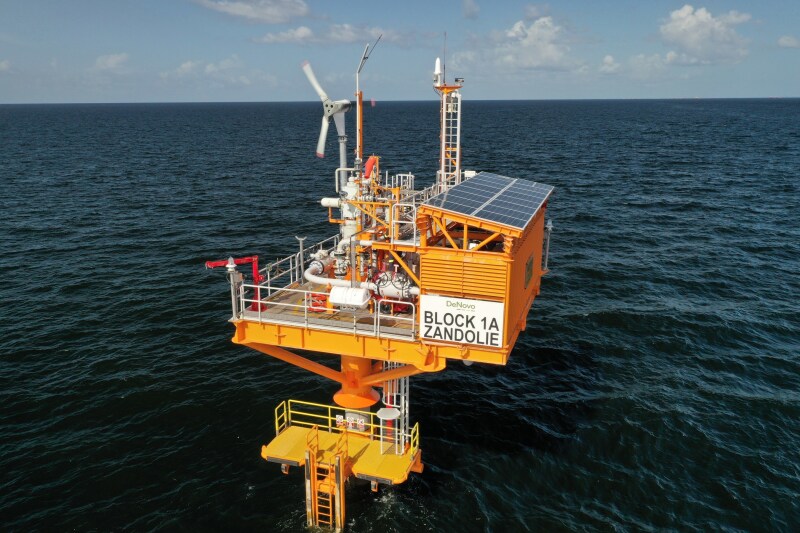DeNovo Energy has started gas production from the offshore Zandolie field in Trinidad & Tobago.
The field, located in the Gulf of Paria off the west coast of Trinidad, is DeNovo’s second offshore development following the Iguana field development in the same Block 1(a).
The $52-million investment by the Trinidad-based DeNovo demonstrates the company’s commitment to increasing Trinidad’s natural gas supply by developing stranded and marginal gas reserves, it said in a statement.
Gas from the field is produced through a single well, conductor-supported platform with a nameplate capacity of 40 MMcf/D of gas.
This unmanned facilities platform, designed by UK-based offshore engineering firm Aquaterra Energy, is installed in 20 m of water, and tied back to the Iguana platform.
The Aquaterra Sea Swift conductor-supported platform design is powered by a wind turbine and a solar bank. Use of the dual-energy resource reduces intermittency risk and includes a battery to store excess power.
Additionally, the platform is equipped with an intelligent monitoring technology that alerts personnel through onshore systems when a maintenance visit is required.
The integration of renewable resources makes Zandolie the first design of its kind in Trinidad and Tobago, according to DeNovo.
"This critical milestone in DeNovo's second field development highlights the drive by the team to constantly improve and learn. We pushed ourselves to deliver a greener and more local platform," said DeNovo's Managing Director, Bryan Ramsumair, in the release.
"The result is that the Zandolie platform is a local fabrication which is 100% powered by renewable energy—and which will minimize the carbon footprint of our operations.”
Aquaterra was awarded the front-end engineering and design contract for the project in May 2020. The firm had previously designed, built, and installed a Sea Swift conductor-supported platform for DeNovo at the Iguana field in 2018.
"The ground-breaking project harnessed a light, locally built renewably powered minimum facilities platform to produce gas for the petrochemicals industry," Stewart Maxwell, Aquaterra Energy's Technical Director, told JPT.
He added that the design uses about 30% less steel than conventional jacketed foundations, further reducing emissions associated with the platform's construction.
"This project offers a potential blueprint for the sustainable development of our abundant offshore energy resources – identifying the solutions that could shape the offshore industry of the future," Maxwell said.
The field development builds off the existing Iguana infrastructure enabling a more- compact topside structure that is lighter and more efficient, according to DeNovo.
“It is our intention to keep acquiring access to new acreage to allow us to do more projects like this on a regular basis,” said Ramsumair. “With Zandolie, DeNovo is demonstrating that our future energy industry can be done locally and with a lower carbon footprint—both aligned to the country's development objectives."
Construction of the platform was completed at the United Engineering Services Limited local fabrication yard. The Zandolie drilling campaign was also safely conducted by the local Well Services jackup Rig 110.
DeNovo Energy, part of the Proman family of companies, holds an 80% interest in Zandolie and is operator of the field. The National Gas Company of Trinidad & Tobago holds the remaining 20% interest.


